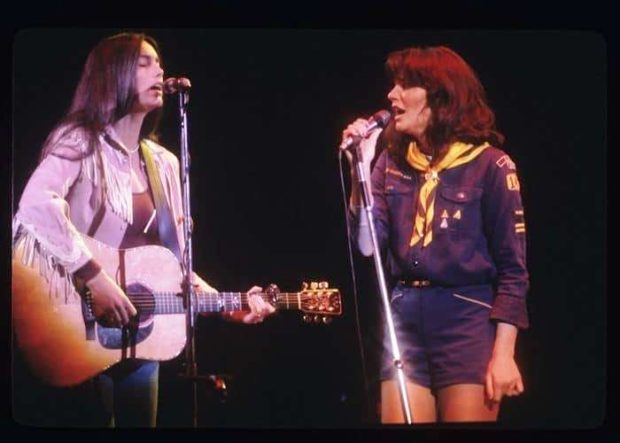
 A portrait of the immensely popular singer profiles Linda Ronstadt’s remarkable career, in which she succeeded in making her own choices that went against conventional wisdom, and the impact of her gorgeous voice.
A portrait of the immensely popular singer profiles Linda Ronstadt’s remarkable career, in which she succeeded in making her own choices that went against conventional wisdom, and the impact of her gorgeous voice.
There’s a new documentary film about a popular singer who was born and raised in my current home town of Tucson, Arizona: Linda Ronstadt. The movie is called Linda Ronstadt: The Sound of My Voice.
After a brief intro presenting the arc of her career, the film explores Ronstadt’s childhood and youth, with Linda herself telling how her Michigan-born mother, daughter of a great inventor, went to the University of Arizona in Tucson where she met Linda’s father, the son of a cattle rancher and musician whose own father had come to Tucson in the 19th century from Mexico. Linda’s father, who later became a prominent local merchant, loved singing Mexican folk songs, and serenaded her mother when he courted her. Their four children, of whom Linda was the youngest, were raised in a household immersed in music. In addition to the Mexican influence (in the film Linda says that as a child she thought Spanish was a language used only in singing), her mother loved the popular American standards and jazz singers, while her sister played country music, and their grandparents were devoted to classical music and opera. This helps to explain Ronstadt’s wide-ranging and inclusive tastes in the music that she sang.
The picture is directed by Rob Epstein and Jeffrey Friedman, both long-time successful non-fiction film creators. They take the usual approach of showing extensive clips from Ronstadt’s life along with excerpts from interviews with her family, friends, and associates. There’s quite an exciting assortment of voices here, including close friends such as J.D. Souther and Bonnie Raitt, along with Jackson Browne, David Geffen, her manager Peter Asher, and many others, for the most part very insightful and moving in their stories and appreciations.
Her career is carefully charted from her start performing with her siblings in Tucson, her arrival in Los Angeles in the 1960s and the first hit single (“Different Drum”) with the Stone Poneys, to her rapid ascent as a pop singer blending country, folk, and rock & roll into multiplatinum albums that dominated the airwaves in the 1970s. The film’s main strategy, wisely, is to showcase her singing. We see clips of her performances from all phases of her life, and oh—that voice! There was nothing like it. I realized watching this movie that I had kind of taken Linda Ronstadt for granted. There she was, a constant presence when I was growing up, with her hit records playing on the radio all the time. But now, hearing the songs again, I was thunderstruck by the power and beauty of that voice. In some of her songs, like, for instance, “You’re No Good” or “Blue Bayou,” she could lull you with a soft opening verse, and then (boom) just turn on the power, with her amazing range and perfect pitch, and the song would just blow you away. She mostly performed other people’s compositions, but several people in the film say that she would take a song and transform it into something totally her own.
By 1980, after reaching the pinnacle of success, she was tired of singing the same hits in huge arenas, and she chose to explore other kinds of music. She did opera (believe it or not); she did standards with Nelson Riddle; she did straight country, in a trio with Dolly Parton and Emmylou Harris; then she mastered the Mexican canciones that her father had taught her. The film shows how each step of the way, industry professionals told her she was nuts, it wouldn’t work, it would ruin her career. She did it anyway, and did it well, and not only that, the records made money. She could sing anything—anything. As Ry Cooder explains in the film, in her heart she wasn’t a careerist, for whom popular success was the primary goal—her purpose was to sing the music she wanted to sing.
In 2011, Linda Ronstadt lost her singing voice and discovered that she had Parkinson’s, and so she retired. She dealt with this as she’s dealt with everything, with wisdom and acceptance. One of the great moments in the movie is when her dear friend Emmylou Harris, choking back some tears, says that Linda doesn’t mind not doing concerts or making records. What she does miss is singing with her friends. Linda Ronstadt: The Sound of My Voice is a beautiful, moving portrait of a wonderful woman and an extraordinary artist.

